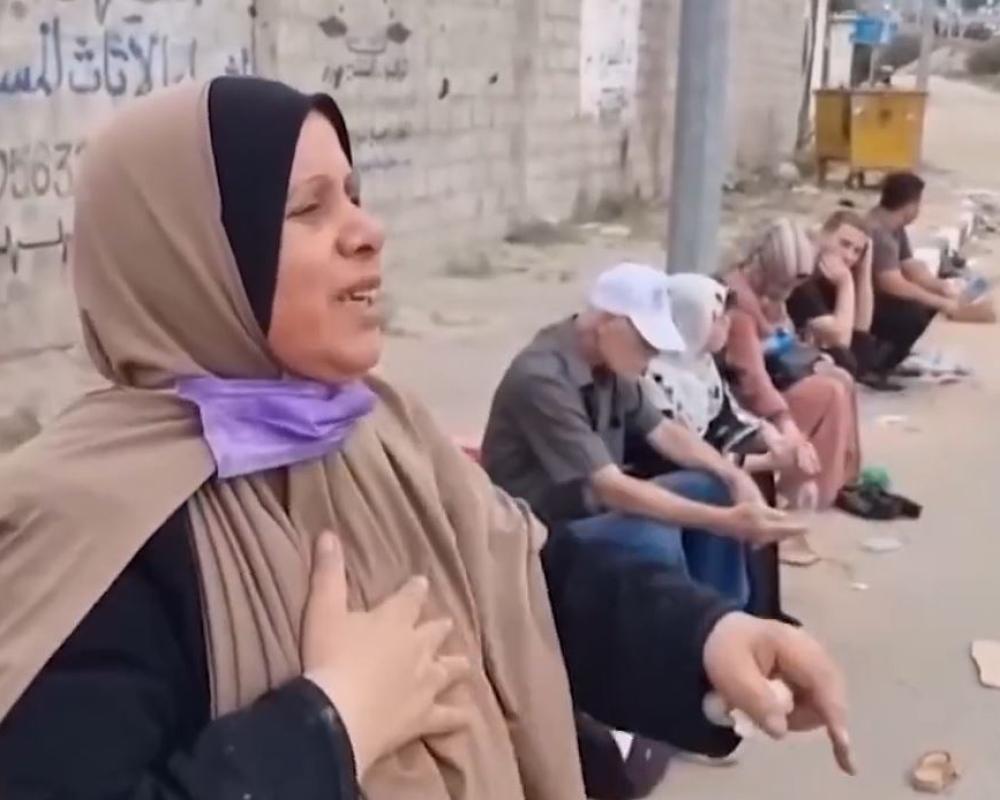
Bethlehem / PNN / written report by Mona Amarna, Video editor Abdullah Al-Azraq -
A report prepared by the Palestine News Network (PNN) as part of the "Investing in Human Rights" project, implemented by Alrowwad Cultural and Arts Society in partnership with and funded by ASTM, highlights severe violations of Palestinian women's rights in Gaza and the West Bank since October 7, 2023, with an increase in both the number and form of these violations.
The Killing of Children in Gaza
Umm Fawaz Abu Ria from Gaza received the news of her four sons' martyrdom while she was away from them, enduring a journey to treat her son in Israeli hospitals inside the Green Line and in West Bank hospitals. She received the news of the martyrdom of her sons, sister, and family due to an Israeli airstrike on their home, turning it into a pile of rubble. The most painful part was Umm Fawaz recounting the agony and suffering her sons endured, whom she had raised and watched grow up before her eyes.
Umm Fawaz shared the pain and suffering of displacement, the difficulty of moving from the Rimal and Jalaa neighborhoods in Gaza, to the suffering of hunger, thirst, and repeated death from the horrific scenes of bombing, killing, and siege by the occupier's tanks and forces that spared neither young nor old. She recounts the tragedy and pain of losing her sons, saying "they are with me, and I can't believe they were martyred."
She described her journey to the West Bank as filled with pain while treating her son Fadi in Israeli hospitals after a work accident that left him completely paralyzed. She remained away from her sons for six months before the war and suffered with them through their fear moment by moment until she received the news of their martyrdom due to an Israeli airstrike on her sister's family home, which killed her sons, sister, and family. Their bodies remain trapped under the rubble, unable to be retrieved by civil defense to this day.
Continuous Killing in Jenin Camp
Kifaya Ubaid from Jenin camp speaks about the pain of losing her mother, martyr Kifah Ubaid, who was killed on the morning of Thursday, January 26, 2024, when the people of Jenin camp awoke to the sound of Israeli tanks and soldiers besieging their camp, with the loud and heavy sound of Israeli gunfire. As usual, the curiosity of the camp's residents led them to see what was happening. Martyr Kifah Ubaid stood with her daughters to see what was going on when two sniper bullets hit her, causing her to die in her daughter Kifaya's arms.
Kifaya describes her mother, who always wished to die as a martyr, and how her mother and the medical team who came to provide aid were subjected to a barrage of bullets. She talks about the struggle to get her mother to an ambulance and how she was unable to reach the hospital to check on her mother, only learning of her death later that afternoon after the occupation forces withdrew from the camp.
Kifaya describes the pain and suffering of losing her mother, which she still cannot believe, saying "My mother's spirit is still with us, seeing and living with us at all times."
Assaults and Attempts of Harassment Against Female Prisoners
Freed prisoner Lama Khater shares the suffering of female prisoners behind the occupier's bars, highlighting the painful reality of female prisoners from Gaza who are subjected to humiliation, severe beatings, repression, and mistreatment. She describes their situation as worse than that of female prisoners from the West Bank, who face verbal harassment, threats of rape, and obscene insults from guards, in addition to severe beatings in detention centers, fines, deprivation of showers for long periods, and solitary confinement for trivial reasons such as singing national songs or speaking to a female soldier.
Lama calls on national and international organizations concerned with prisoners to stand up against Israel and its policies towards prisoners and to apply international laws for Palestinian prisoners in Israeli jails. She reflects on the suffering of imprisoned mothers and their children, who are deprived of maternal affection and family security due to their imprisonment.
Torture and Arrests of Minor Girls
Freed prisoner Hanin Masaid from Aida camp, who was arrested at the beginning of the Gaza war and re-arrested this year, remains in Israeli jails. She stated in a previous interview with PNN that she was arrested for conveying the truth through Facebook and experienced the brutality of the occupier during her detention.
Hanin recounts the harsh conditions of her imprisonment, describing it as "a difficult prison that robs you of your freedom," where female prisoners face violations of their rights. She emphasizes that being a prisoner is not just a number but a cause of suffering, resilience, and patience. Despite the conditions of her release, which included silencing and preventing her from conveying the suffering of prisoners, Hanin says that her experience has only strengthened her resolve to continue conveying the truth and pursuing her struggle in writing and singing for the prisoners.
Hanin also describes the suffering of female prisoners in consuming poor-quality food, experiencing violence and humiliation after the Gaza war, and facing increased hardships following the withdrawal of privileges from prisoners.